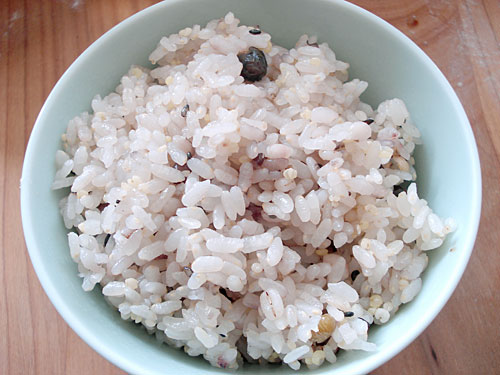Someone alerted me to this entry on the Health.com blog which quotes me. (Health.com is a Time Inc. property.) I just wanted to set some things straight, because a couple of the statements there are just not right.
Filed under:
japanese weightloss health japan wagashi
[Update:] There seems to be some confusion about how zakkokumai is cooked and looks like, so I've added some more photos and such.

Rice is such an integral part of a Japanese meal, that the word for 'meal' (gohan, ご飯) also means rice. White rice is the norm, both for taste and for various cultural reasons. But as you probably know, white rice (hakumai, 白米) is rice that has been stripped of most of its nutrients, leaving just the starch.
Brown rice (genmai) is the obvious healthier alternative. But brown rice can take some time to cook, what with the soaking and so on that's needed, and some people simply don't like the taste or texture.
In recent years, something called zakkoku-mai (雑穀米)has become increasingly popular in Japan. Zakkoku just means "mixed grains", and mai is rice. Another name for essentially the same thing is kokumotsu gohan (穀物ご飯).
Filed under:
japanese ingredients rice health
Tuna with a side of mercury, and all that.
Filed under:
ethics philosophy health
I was hoping that I would avoid my usual bout with a cold/flu around this time of the year with healthier eating and regular exercise and all that, but no such luck. Once again I'm enduring the stuffed head, sore throat, and achy body. My favorite home remedy to combat a cold, besides Ricola tea, is lemon-honey water: the juice of one lemon in a big mug with hot water and a spoonful of honey. My grandmother's favorite remedy was umeboshi, though I'm not sure why (she believed in umeboshi for a variety of ailments). What are your favorite homemade cold remedies?
Filed under:
health
Seamaiden, who has a lovely gluten-free blog called Book of Yum, asked in the comments here whether Ajinomoto is gluten-free. Since I know that a lot of people become interested in rice-centric Asian cuisines, including Japanese, because of the wide variety of wheat-free dishes, I thought I'd post some of my findings here about Ajinomoto and dashi stock granules rather than bury them in the comments.
Monosodium glutamate or MSG is a concentrated and manufactured form of umami. It is a flavor enhancer with a lot of controversy. I won't get into that at the moment, since reactions to MSG really vary widely depending on the individual. The reality is that MSG is present in many manufactured food products.
Filed under:
japanese ingredients health gluten-free
Unless you live in the UK, you probably don't know who Gillian McKeith is. I didn't know much about her even though I do watch British television, since she has a show on Channel 4, which I don't get here. Apparently she is famous as the host of a diet show called "You Are What You Eat", bestselling author of diet books, and hawker of herbal pills. She puts a Doctor in front of her name, and she's regarded as a Health Authority. Yet, she is not a medical doctor or even a properly trained and certified nutritionist. Her only health related degree may or may not come via a correspondence course from a non-accredited American college.
Filed under:
books and media ethics health
Since I started my whole get fitter/lighter process last month, I haven't ingested much sugar. I didn't avoid it entirely, but was using quite small quantities - a spoonful of jam here, a bit of honey there, that sort of thing. (It's also hard to avoid all sugar in Japanese cooking - a bit is often added to enhance the flavor.)
I never had a big sweet tooth to start with, so I didn't really miss sugary snacks that much in a physical sense. But I did miss the whole idea and process of making something sweet, of the house filling up with those smells. Besides, Valentine's Day is coming up this week and that means chocolate!
So an afternoon of experimentation followed, which resulted in the spiced chocolate cupcakes. The cupcakes were divine, and I overindulged and had three in a row.
Filed under:
offbeat health
Anyone who has any interest in food, nutrition, where our food comes from, and most importantly, how to eat at all, should read the massive (12 pages) article by Michael Pollan in the New York Times, Unhappy Meals.
Filed under:
lighter ethics philosophy health